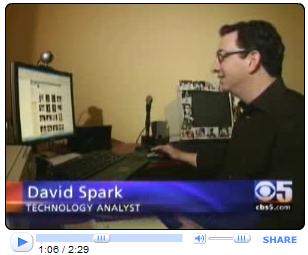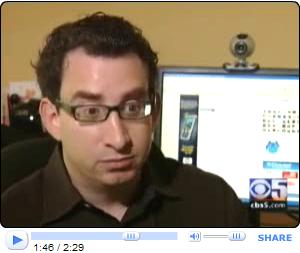Sue Kwon, technology reporter for CBS-channel 5 in San Francisco, came by to talk about privacy issues of Facebook as it’s opening up its network to be indexed by search engines like Google. This is becoming a big story but for all the wrong reasons. Facebook’s competitors LinkedIn, MySpace, and Friendster already allow their content to be indexed by the search engines. They never put out a public release to say, “Heads up, your content on this site can be found by search engines outside of our social network.” Because they never announced it, it’s like it didn’t happen. But along comes Facebook who hasn’t previously made its content available to search engines. And being transparent with their actions, Facebook is saying, we’re about to release your information. Tell us now if you don’t want it released, and we won’t. Unlike its competitors, Facebook is being proactive about privacy. The press, not realizing this is already going on without any announcements by the other social networks, decide to spin the story as if to say, “Facebook is invading our privacy by opening it up to Google.”
 Sue Kwon who works for a local news station saw a different, but valid story. The story of young people posting way too much of their personal information online in the way of photos of themselves and their friends.
Sue Kwon who works for a local news station saw a different, but valid story. The story of young people posting way too much of their personal information online in the way of photos of themselves and their friends.
What appears to be the problem, as seen in this TV segment, is college students who were the only ones originally allowed on Facebook felt the social network offered a safe haven. With a “What me worry?” attitude, they posted hundreds of photos of themselves, not thinking anyone outside of their college friends could or would ever see them. But that’s all changed once Facebook opened up its network to all users, not just individuals with a .edu email address. College students might want to either remove all their posted college hijinxs or change Facebook’s profile-viewing privacy settings to anything but “Everyone.”
Again, this story stems from Facebook announcing they’re going to make their content available to search engine indexing. Facebook’s results from a Google search will only reveal the person’s photo and name, not profile. This is not the case with MySpace, LinkedIn, and Friendster who by default (I believe) have public profiles. According to the language in the Google-powered Facebook results, it appears searchers will be able to click over to see a full profile if that user allows it.
“You are seeing this because you clicked on a public search listing link from a search engine or other external site. Since you are logged in, you may be able to click through to contact this person.”
– from a Google search result of a person on Facebook
In most cases when people put up a profile on a social network, they WANT people to see it. It appears local news reporters have an obligation to warn parents, or at least scare the crap out of them so they watch the segment.
Two funny final comments about the piece:
- When I turned on the news tonight to watch the segment with my girlfriend we were joking that my Facebook interview was so important that it had to be the lead story. And you know what? IT WAS!!!
- Watch the piece and Sue Kwon equates me to the endless minions of weirdos that troll sites looking for college girls.
“Bonnie scrambles to change her privacy settings so Dave and any other strangers can’t see more than her name and face on Facebook.”
How did I become the creepy stranger. It was Sue Kwon who gave me the intern’s name to look up. I think she’s the enabler.
All in jest, Sue. Great segment.
;)




